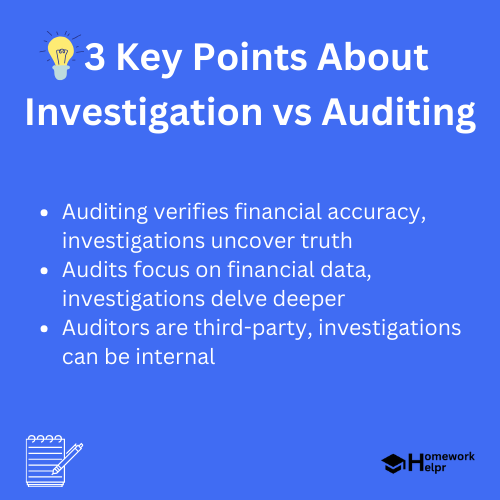📝 Summary
In the realm of finance, investigation and auditing are critical yet distinct processes. Auditing involves a systematic examination of financial records to ensure accuracy and compliance with regulations, typically conducted by third-party auditors. Its goal is transparency and trust, yielding a report showcasing findings and recommendations. In contrast, an investigation explores allegations of unethical behavior, requiring comprehensive methods like interviews and evidence collection, and may result in legal actions. While audits focus on financial accuracy, investigations address broader misconduct issues. Knowing when to engage audit or investigation processes is essential for maintaining accountability in financial practices.
Investigation vs Auditing: Understanding the Differences
In the world of finance and accountability, two terms often come up: investigation and auditing. While they might seem similar at first glance, they actually serve different purposes and involve distinct processes. Understanding the nuances between these terms is crucial, whether you are a student learning about financial practices or someone looking to work in these fields in the future.
What is Auditing?
Auditing can be defined as the systematic examination of financial records and statements to ensure accuracy and compliance with established regulations. Generally conducted by a third-party professional, known as an auditor, the audit is an essential aspect of maintaining transparency and trust in financial practices.
- Types of Audits: There are various types of audits, including internal, external, and forensic audits. Each serves different purposes but shares the main goal of verifying financial accuracy.
- Standards and Regulations: Auditors follow specific guidelines and regulations, such as Generally Accepted Accounting Principles (GAAP) or International Financial Reporting Standards (IFRS).
- Reporting: At the end of an audit, a detailed report is generated to present findings and recommendations to stakeholders.
Auditing typically focuses on the financial accuracy of statements, ensuring that all amounts align with documented transactions. Auditors look for anomalies or discrepancies that could indicate errors or fraud. Their reports provide stakeholders with the confidence that a company’s financial health is accurately represented.

What is Investigation?
Investigation involves a deeper inquiry into issues that arise, which may or may not be related to financial matters. It is often considered a more in-depth and broader process than auditing, where the goal is to uncover the truth behind suspicious activities or irregularities.
- Purpose: The primary purpose of an investigation is to uncover facts and evidence regarding unethical or unlawful activities.
- Methods: Investigations may involve interviews, collection of evidence, and collaboration with law enforcement, if necessary.
- Outcome: Unlike an audit, investigations may result in legal actions or disciplinary measures.
Investigation often employs various techniques and practices tailored to reveal the truth behind a situation, especially in cases that could have legal implications. For instance, if a company suspects fraud or mismanagement, they might launch an investigation to identify those responsible.
Key Differences Between Investigation and Auditing
To summarize the differences, let‚’ outline some of the key distinctions between an audit and an investigation:
- Objective: Auditing aims to verify financial accuracy, while investigation seeks to uncover truth behind allegations.
- Scope: An audit is generally restricted to financial data, while investigations can cover broader issues, including misconduct.
- Conduct: Auditors are usually third-party professionals; investigations can involve internal or external teams.
- Outcome: Auditing results in a report, whereas investigations can lead to legal actions.
💡Did You Know?
The first known audit dates back to ancient Egypt around 3000 BC, where scribes monitored the distribution of grain!
When to Use Investigation and Auditing?
Understanding when to conduct an audit versus when to launch an investigation is vital for any organization. Companies typically engage in regular audits to maintain transparency and prevent mismanagement. On the other hand, if there is a suspicion of wrongdoing or illegal activity, an investigation should be initiated.
Here are some scenarios when each process is appropriate:
- Use Auditing When:
- Routine financial health checks are required.
- Ensuring compliance with regulations is necessary.
- Preparing reports for stakeholders.
- Use Investigation When:
- Allegations of fraud or misconduct arise.
- Financial discrepancies or irregularities are detected.
- Legal compliance issues need to be addressed.
Examples to Illustrate the Concepts
Example
For instance, a corporation may conduct an annual audit to evaluate its financial statements and ensure they comply with relevant accounting standards. This process might uncover minor discrepancies, but does not necessarily suggest wrongdoing.
Example
Conversely, if a whistleblower reports suspected embezzlement of funds, the company would initiate an investigation to scrutinize the activities of certain employees and gather evidence leading to potential legal action.
Conclusion
In conclusion, while investigation and auditing are both essential components of financial oversight and accountability, they are distinct processes tailored for different objectives. Auditing ensures the validity and reliability of financial information, while investigation digs deeper to uncover the truth behind allegations or misconduct. Understanding these differences equips individuals and organizations to respond appropriately to various situations, fostering a culture of integrity and accountability in finance.
Definition
Accounting Principles: The rules and guidelines that companies follow in preparing financial statements, including GAAP and IFRS.
Definition
Fraud: Wrongful or criminal deception intended to result in financial or personal gain.
Definition
Transparency: The openness and clarity in an entity’s actions and decisions, particularly concerning financial documentation.
Related Questions on Investigation vs Auditing
What is the main purpose of auditing?
Answer: The primary purpose of auditing is to verify the financial accuracy of records and ensure compliance with established regulations.
What triggers an investigation?
Answer: An investigation is typically triggered by allegations of fraud, misconduct, or detected financial discrepancies.
Who conducts audits?
Answer: Audits are generally conducted by external or third-party professionals known as auditors.
What is the outcome of an investigation?
Answer: The outcome of an investigation can result in legal actions or disciplinary measures based on the findings.
